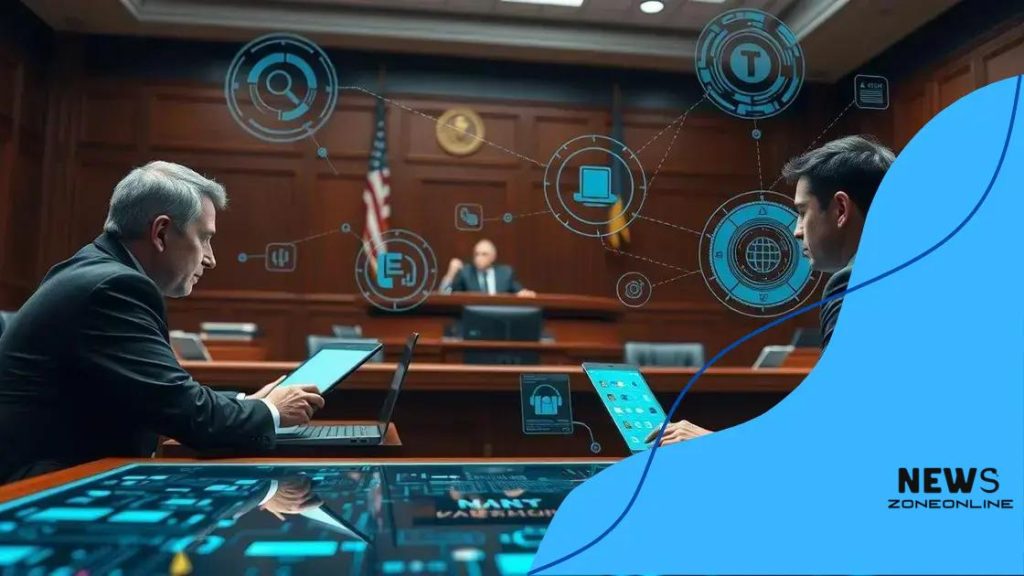Artificial intelligence in judicial systems: a deep dive

Artificial Intelligence in judicial systems enhances efficiency, improves access to justice, and streamlines legal processes, but it also raises concerns about data privacy, bias, and the need for clear regulatory frameworks.
Artificial Intelligence in Judicial Systems is becoming a hot topic, especially with its potential to transform legal practices. But how does this technology affect fairness and transparency in the justice system? Let’s explore!
Understanding artificial intelligence in the judiciary
Understanding artificial intelligence in the judiciary is crucial as we navigate the changing landscape of legal practices. This technology can enhance efficiency and accuracy in legal proceedings.
What is Artificial Intelligence in the Judiciary?
Artificial intelligence in the judiciary refers to the use of advanced algorithms and data analysis to support legal processes. This integration can lead to improved decision-making and streamlined operations.
Benefits of AI in the Judiciary
The benefits of using AI in legal systems include:
- Increased efficiency with case management
- Enhanced research capabilities through data mining
- Improved access to legal information for all parties
- Reduction in human error during documentation
By harnessing AI, the judiciary can process cases more swiftly, allowing for faster resolutions and improved access to justice for everyone involved.
Additionally, AI technologies can assist judges and lawyers in evaluating case law, predicting outcomes, and even analyzing past rulings to ensure fairer judgments.
Challenges Faced with AI Integration
While the advantages are significant, integrating AI into the judiciary also presents challenges. Ethical concerns about bias and accountability need to be addressed. Ensuring that algorithms are transparent and fair is vital to maintaining public trust.
Another challenge is the need for adequate training for legal professionals to effectively utilize these technologies. Continuous learning and adaptation will be essential as these systems evolve.
In conclusion, understanding artificial intelligence in the judiciary is essential for its successful implementation. While there are many benefits, including increased efficiency and accuracy, it’s crucial to navigate the ethical implications and challenges that arise.
Ethical implications of AI in legal practices
The ethical implications of AI in legal practices are significant and merit careful examination. As this technology becomes integrated into the judicial system, concerns regarding fairness, bias, and accountability arise.
Understanding Bias in AI
One of the most pressing issues is bias. If the data used to train AI systems contains biases, the outcomes can be detrimental. For example, AI might unfairly favor one demographic over another, leading to unjust legal decisions.
Accountability and Responsibility
Accountability in decision-making is another concern. When AI systems make recommendations or decisions in legal contexts, it raises questions about who is responsible if errors occur. Is it the developers, the lawyers, or the judges who should bear the accountability?
- The need for transparency in AI algorithms
- Establishing legal frameworks for AI usage
- Ongoing monitoring of AI outcomes
- Encouraging diversity in data collection
Ensuring that AI systems are transparent helps mitigate these concerns. By making algorithms understandable and the decision-making processes clear, stakeholders can better trust the technology.
Moreover, the integration of AI must include comprehensive frameworks that govern its use in legal practice. This can help ensure ethical compliance and promote fairness. As it stands, laws are often not keeping pace with technological advancements, creating a gap that must be bridged.
Impact on Legal Professionals
Legal professionals need to be aware of the ethical implications. Training programs focused on AI ethics will be essential to prepare lawyers and judges for future challenges. By fostering a culture that emphasizes ethical standards, the legal field can better navigate the complexities of technology.
In summary, as we look at the ethical implications of AI in legal practices, it becomes clear that awareness, accountability, and training are paramount. Addressing these concerns is critical to harnessing the benefits of technology while ensuring justice remains fair and just.
Real-world examples of AI applications in courts

Real-world examples of AI applications in courts showcase how technology enhances the judicial process. These applications are proving to be both efficient and transformative in various legal settings.
Case Management Systems
One prominent example is the use of AI-powered case management systems. These systems help courts manage large volumes of cases by automating administrative tasks. They can sort documents, schedule hearings, and monitor deadlines, allowing legal professionals to focus more on substantive legal work.
Predictive Analytics
Another fascinating application is found in predictive analytics. Courts in several jurisdictions use AI to analyze historical case data. This analysis helps predict case outcomes, enabling judges and attorneys to make informed decisions. For instance, predictive models can estimate the likelihood of a defendant reoffending, guiding judges during bail hearings.
- Example: TheChicago Police Department uses predictive algorithms to prevent crime.
- Example: Various courts utilize AI to streamline traffic violation cases.
- Example: AI tools help assess damages in personal injury cases.
The implementation of chatbots is also gaining ground. These AI systems provide legal information to the public, assisting with common inquiries about procedures and paperwork. By offering immediate responses, chatbots improve access to justice for individuals who may not have legal representation.
Sentencing Recommendations
AI has even made strides in the area of sentencing recommendations. Some jurisdictions employ algorithms that analyze cases to recommend appropriate sentences. While controversial, these systems aim to promote consistency in sentencing and reduce disparity.
Overall, the integration of AI in legal practices is continuous. These real-world examples demonstrate that technology is not just a concept; it has practical applications that can improve the efficiency and fairness of the judicial system.
Challenges in implementing AI in judicial systems
The challenges in implementing AI in judicial systems are significant and complex. As courts begin to adopt these technologies, various obstacles must be addressed to ensure successful integration.
Data Privacy Concerns
One major challenge involves data privacy. Legal data is often sensitive, containing personal information about individuals involved in cases. Protecting this data while allowing AI systems to analyze it poses a substantial hurdle. Courts must implement stringent measures to safeguard privacy and comply with regulations.
Bias and Fairness
Another critical issue is bias. If the training data used for AI systems includes biases, the outcomes may lead to unfair decisions. Courts need to ensure that AI algorithms are transparent and that they promote fairness, rather than exacerbate existing inequalities.
- Training data should be diverse and representative.
- Regular audits of AI decision-making processes are essential.
- Engaging diverse stakeholders can help minimize bias.
Furthermore, the legal community must recognize the potential for bias and work collectively to address it. By fostering a culture of accountability and transparency, stakeholders can help mitigate these risks.
Resistance to Change
Resistance to change is also a significant challenge within the judiciary. Some legal professionals may be hesitant to embrace AI technologies, fearing that it will replace their roles. This reluctance can slow down the implementation process and hinder progress. Education and training are crucial in demonstrating the benefits of AI, showing how it can assist rather than replace legal practitioners.
Finally, the lack of a clear regulatory framework can complicate matters. Courts need guidelines to navigate the legal and ethical implications of AI use. Developing comprehensive policies will be essential for ensuring that AI technologies align with judicial principles.
Future trends: AI and the evolution of justice
The future trends of AI in the evolution of justice are promising and transformative. As technology continues to advance, its integration into legal systems is likely to reshape how justice is served.
Increased Automation of Processes
One key trend is the increased automation of legal processes. AI technologies will streamline routine tasks, allowing legal professionals to focus on more complex issues. For instance, document review and legal research can be handled efficiently by AI systems, speeding up workflows significantly.
Enhanced Access to Justice
Another important development is the potential for enhanced access to justice. AI-powered chatbots and virtual assistants can provide legal information to individuals who might not afford an attorney. This democratization of information aims to empower citizens and ensure everyone has access to legal resources.
- Chatbots providing 24/7 legal advice.
- Online platforms facilitating pro bono legal services.
- AI tools that analyze legal precedents for better understanding.
Moreover, the conversation around ethical AI usage will continue to evolve. The legal community will likely establish more robust guidelines to ensure that AI applications are fair and unbiased.
Greater Use of Predictive Analytics
Predictive analytics will gain traction in predicting legal outcomes. Courts can leverage AI to analyze historical case data and identify patterns. Lawyers can use these insights to craft better strategies for their clients. This will lead to more informed decision-making and potentially better legal outcomes.
Additionally, with the evolution of smart contracts powered by AI, the legal landscape will see new frameworks for agreements. These contracts can self-execute when conditions are met, which could change how transactions are managed legally.
Finally, the integration of AI into the judiciary will not only improve efficiency but can also cultivate a more transparent and accountable legal system, allowing for continuous improvement in legal practices.
FAQ – Frequently Asked Questions about Artificial Intelligence in Judicial Systems
What are the primary benefits of integrating AI into the judicial system?
Integrating AI can enhance efficiency, streamline case management, and improve access to legal resources for the public.
How does AI help with bias in legal decisions?
AI can identify patterns and biases in data, helping legal professionals understand and mitigate biases in decision-making processes.
What role do chatbots play in the legal field?
AI-powered chatbots assist by providing legal information and answering common queries, making legal resources more accessible to the public.
What challenges do courts face when implementing AI technologies?
Challenges include data privacy concerns, potential biases in AI algorithms, resistance to change among legal professionals, and the need for clear regulations.





